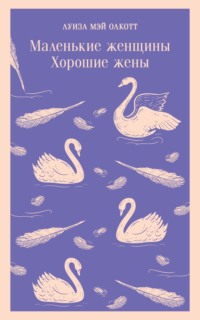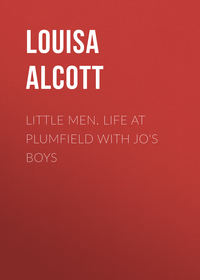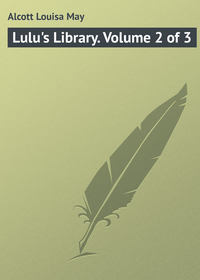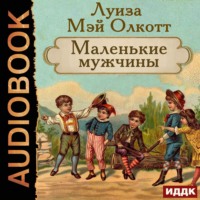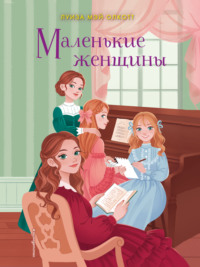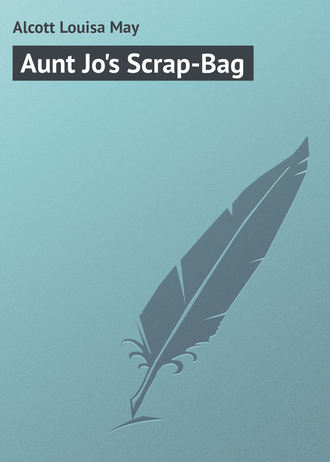 полная версия
полная версияAunt Jo's Scrap-Bag

Alcott Louisa May
Aunt Jo's Scrap-Bag
MY BOYS
Feeling that I have been unusually fortunate in my knowledge of a choice and pleasing variety of this least appreciated portion of the human race, I have a fancy to record some of my experiences, hoping that it may awaken an interest in other minds, and cause other people to cultivate the delightful, but too often neglected boys, who now run to waste, so to speak.
I have often wondered what they thought of the peculiar treatment they receive, even at the hands of their nearest friends. While they are rosy, roly-poly little fellows they are petted and praised, adorned and adored, till it is a miracle that they are not utterly ruined. But the moment they outgrow their babyhood their trials begin, and they are regarded as nuisances till they are twenty-one, when they are again received into favor.
Yet that very time of neglect is the period when they most need all manner of helps, and ought to have them. I like boys and oysters raw; so, though good manners are always pleasing, I don't mind the rough outside burr which repels most people, and perhaps that is the reason why the burrs open and let me see the soft lining and taste the sweet nut hidden inside.
My first well-beloved boy was a certain Frank, to whom I clung at the age of seven with a devotion which I fear he did not appreciate. There were six girls in the house, but I would have nothing to say to them, preferring to tag after Frank, and perfectly happy when he allowed me to play with him. I regret to say that the small youth was something of a tyrant, and one of his favorite amusements was trying to make me cry by slapping my hands with books, hoop-sticks, shoes, anything that came along capable of giving a good stinging blow. I believe I endured these marks of friendship with the fortitude of a young Indian, and felt fully repaid for a blistered palm by hearing Frank tell the other boys, 'She's a brave little thing, and you can't make her cry.'
My chief joy was in romping with him in the long galleries of a piano manufactory behind our house. What bliss it was to mount one of the cars on which the workmen rolled heavy loads from room to room, and to go thundering down the inclined plains, regardless of the crash that usually awaited us at the bottom! If I could have played foot-ball on the Common with my Frank and Billy Babcock, life could have offered me no greater joy at that period. As the prejudices of society forbid this sport, I revenged myself by driving hoop all around the mall without stopping, which the boys could not do.
I can remember certain happy evenings, when we snuggled in sofa corners and planned tricks and ate stolen goodies, and sometimes Frank would put his curly head in my lap and let me stroke it when he was tired. What the girls did I don't recollect; their domestic plays were not to my taste, and the only figure that stands out from the dimness of the past is that jolly boy with a twinkling eye. This memory would be quite radiant but for one sad thing – a deed that cut me to the soul then, and which I have never quite forgiven in all these years.
On one occasion I did something very naughty, and when called up for judgment fled to the dining-room, locked the door, and from my stronghold defied the whole world. I could have made my own terms, for it was near dinner time and the family must eat; but, alas for the treachery of the human heart! Frank betrayed me. He climbed in at the window, unlocked the door, and delivered me up to the foe. Nay, he even defended the base act, and helped bear the struggling culprit to imprisonment. That nearly broke my heart, for I believed he would stand by me as staunchly as I always stood by him. It was a sad blow, and I couldn't love or trust him any more. Peanuts and candy, ginger-snaps and car-rides were unavailing; even foot-ball could not reunite the broken friendship, and to this day I recollect the pang that entered my little heart when I lost my faith in the loyalty of my first boy.
The second attachment was of quite a different sort, and had a happier ending. At the mature age of ten, I left home for my first visit to a family of gay and kindly people in – well why not say right out? – Providence. There were no children, and at first I did not mind this, as every one petted me, especially one of the young men named Christopher. So kind and patient, yet so merry was this good Christy that I took him for my private and particular boy, and loved him dearly; for he got me out of innumerable scrapes, and never was tired of amusing the restless little girl who kept the family in a fever of anxiety by her pranks. He never laughed at her mishaps and mistakes, never played tricks upon her like a certain William, who composed the most trying nicknames, and wickedly goaded the wild visitor into all manner of naughtiness. Christy stood up for her through everything; let her ride the cows, feed the pigs, bang on the piano, and race all over the spice mill, feasting on cinnamon and cloves; brought her down from housetops and fished her out of brooks; never scolded, and never seemed tired of the troublesome friendship of little Torment.
In a week I had exhausted every amusement and was desperately homesick. It has always been my opinion that I should have been speedily restored to the bosom of my family but for Christy, and but for him I should assuredly have run away before the second week was out. He kept me, and in the hour of my disgrace stood by me like a man and a brother.
One afternoon, inspired by a spirit of benevolence, enthusiastic but short-sighted, I collected several poor children in the barn, and regaled them on cake and figs, helping myself freely to the treasures of the pantry without asking leave, meaning to explain afterward. Being discovered before the supplies were entirely exhausted, the patience of the long-suffering matron gave out, and I was ordered up to the garret to reflect upon my sins, and the pleasing prospect of being sent home with the character of the worst child ever known.
My sufferings were deep as I sat upon a fuzzy little trunk all alone in the dull garret, thinking how hard it was to do right, and wondering why I was scolded for feeding the poor when we were expressly bidden to do so. I felt myself an outcast, and bewailed the disgrace I had brought upon my family. Nobody could possibly love such a bad child; and if the mice were to come and eat me then and there – à la Bishop Hatto – it would only be a relief to my friends. At this dark moment I heard Christy say below, 'She meant it kindly, so I wouldn't mind, Fanny;' and then up came my boy full of sympathy and comfort. Seeing the tragic expression of my face, he said not a word, but, sitting down in an old chair, took me on his knee and held me close and quietly, letting the action speak for itself. It did most eloquently; for the kind arm seemed to take me back from that dreadful exile, and the friendly face to assure me without words that I had not sinned beyond forgiveness.
I had not shed a tear before, but now I cried tempestuously, and clung to him like a shipwrecked little mariner in a storm. Neither spoke, but he held me fast and let me cry myself to sleep; for, when the shower was over, a pensive peace fell upon me, and the dim old garret seemed not a prison, but a haven of refuge, since my boy came to share it with me. How long I slept I don't know, but it must have been an hour, at least; yet my good Christy never stirred, only waited patiently till I woke up in the twilight, and was not afraid because he was there. He took me down as meek as a mouse, and kept me by him all that trying evening, screening me from jokes, rebukes, and sober looks; and when I went to bed he came up to kiss me, and to assure me that this awful circumstance should not be reported at home. This took a load off my heart, and I remember fervently thanking him, and telling him I never would forget it.
I never have, though he died long ago, and others have probably forgotten all about the naughty prank. I often longed to ask him how he knew the surest way to win a child's heart by the patience, sympathy, and tender little acts that have kept his memory green for nearly thirty years.
Cy was a comrade after my own heart, and for a summer or two we kept the neighbourhood in a ferment by our adventures and hair-breadth escapes. I think I never knew a boy so full of mischief, and my opportunities of judging have been manifold. He did not get into scrapes himself, but possessed a splendid talent for deluding others into them, and then morally remarking, 'There, I told you so!' His way of saying 'You dars'nt do this or that' was like fire to powder; and why I still live in the possession of all my limbs and senses is a miracle to those who know my youthful friendship with Cy. It was he who incited me to jump off of the highest beam in the barn, to be borne home on a board with a pair of sprained ankles. It was he who dared me to rub my eyes with red peppers, and then sympathisingly led me home blind and roaring with pain. It was he who solemnly assured me that all the little pigs would die in agony if their tails were not cut off, and won me to hold thirteen little squealers while the operation was performed. Those thirteen innocent pink tails haunt me yet, and the memory of that deed has given me a truly Jewish aversion to pork.
I did not know him long, but he was a kindred soul, and must have a place in my list of boys. He is a big, brown man now, and, having done his part in the war, is at work on his farm. We meet sometimes, and though we try to be dignified and proper, it is quite impossible; there is a sly twinkle in Cy's eye that upsets my gravity, and we always burst out laughing at the memory of our early frolics.
My Augustus! oh, my Augustus! my first little lover, and the most romantic of my boys. At fifteen I met this charming youth, and thought I had found my fate. It was at a spelling school in a little country town where I, as a stranger and visitor from the city, was an object of interest. Painfully conscious of this fact, I sat in a corner trying to look easy and elegant, with a large red bow under my chin, and a carnelian ring in full view. Among the boys and girls who frolicked about me, I saw one lad of seventeen with 'large blue eyes, a noble brow, and a beautiful straight nose,' as I described him in a letter to my sister. This attractive youth had a certain air of refinement and ease of manner that the others lacked; and when I found he was the minister's son, I felt that I might admire him without loss of dignity. 'Imagine my sensations,' as Miss Burney's Evelina says, when this boy came and talked to me, a little bashfully at first, but soon quite freely, and invited me to a huckleberry party next day. I had observed that he was one of the best spellers. I also observed that his language was quite elegant; he even quoted Byron, and rolled his eyes in a most engaging manner, not to mention that he asked who gave me my ring, and said he depended on escorting me to the berry pasture.
'Dear me, how interesting it was! and when I found myself, next day, sitting under a tree in the sunny field (full of boys and girls, all more or less lovering), with the amiable Augustus at my feet, gallantly supplying me with bushes to strip while we talked about books and poetry, I really felt as if I had got into a novel, and enjoyed it immensely. I believe a dim idea that Gus was sentimental hovered in my mind, but I would not encourage it, though I laughed in my sleeve when he was spouting Latin for my benefit, and was uncertain whether to box his ears or simper later in the day, when he languished over the gate, and said he thought chestnut hair the loveliest in the world.
Poor, dear boy! how innocent and soft-hearted and full of splendid dreams he was, and what deliciously romantic times we had floating on the pond, while the frogs sung to his accordion, as he tried to say unutterable things with his honest blue eyes. It makes me shiver now to think of the mosquitoes and the damp; but it was Pauline and Claude Melnotte then, and when I went home we promised to be true to one another, and write every week during the year he was away at school.
We parted – not in tears by any means; that sort of nonsense comes later, when the romance is less childish – but quite jolly and comfortable, and I hastened to pour forth the thrilling tale to my faithful sister, who approved of the match, being a perfect 'mush of sentiment' herself.
I fear it was not a very ardent flame, however, for Gus did not write every week, and I did not care a bit; nevertheless, I kept his picture and gave it a sentimental sigh when I happened to think of it, while he sent messages now and then, and devoted himself to his studies like an ambitious boy as he was. I hardly expected to see him again, but soon after the year was out, to my great surprise, he called. I was so fluttered by the appearance of his card that I rather lost my head, and did such a silly thing that it makes me laugh even now. He liked chestnut hair, and, pulling out my combs, I rushed down, theatrically dishevelled, hoping to impress my lover with my ardour and my charms.
I expected to find little Gus; but, to my great confusion, a tall being with a beaver in his hand rose to meet me, looking so big and handsome and generally imposing that I could not recover myself for several minutes, and mentally wailed for my combs, feeling like an untidy simpleton.
I don't know whether he thought me a little cracked or not, but he was very friendly and pleasant, and told me his plans, and hoped I would make another visit, and smoothed his beaver, and let me see his tail-coat, and behaved himself like a dear, conceited, clever boy. He did not allude to our love-passages, being shy, and I blessed him for it; for really, I don't know what rash thing I might have done under the exciting circumstances. Just as he was going, however, he forgot his cherished hat for a minute, put out both hands, and said heartily, with his old boyish laugh, – 'Now you will come, and we'll go boating and berrying, and all the rest of it again, won't we?'
The blue eyes were full of fun and feeling, too, I fancied, as I blushingly retired behind my locks and gave the promise. But I never went, and never saw my little lover any more, for in a few weeks he was dead of a fever, brought on by too much study, – and so ended the sad history of my fourth boy.
After this, for many years, I was a boyless being; but was so busy I did not feel my destitute condition till I went to the hospital during the war, and found my little sergeant. His story has been told elsewhere, but the sequel to it is a pleasant one, for Baby B. still writes to me now and then, asks advice about his future, and gladdens me with good news of his success as a business man in Kansas.
As if to atone for the former dearth, a sudden shower of most superior boys fell upon me, after I recovered from my campaign. Some of the very best sort it was my fortune to know and like – real gentlemen, yet boys still – and jolly times they had, stirring up the quiet old town with their energetic society.
There was W., a stout, amiable youth, who would stand in the middle of a strawberry patch with his hands in his pockets and let us feed him luxuriously. B., a delightful scapegrace, who came once a week to confess his sins, beat his breast in despair, vow awful vows of repentance, and then cheerfully depart to break every one of them in the next twenty-four hours. S., the gentle-hearted giant; J., the dandy; sober, sensible B.; and E., the young knight without reproach or fear.
But my especial boy of the batch was A. – proud and cold and shy to other people, sad and serious sometimes when his good heart and tender conscience showed him his short-comings, but so grateful for sympathy and a kind word.
I could not get at him as easily as I could the other lads, but, thanks to Dickens, I found him out at last.
We played Dolphus and Sophy Tetterby in the 'Haunted Man,' at one of the school festivals; and during the rehearsals I discovered that my Dolphus was – permit the expression, oh, well-bred readers! – a trump. What fun we had to be sure, acting the droll and pathetic scenes together, with a swarm of little Tetterbys skirmishing about us! From that time he has been my Dolphus and I his Sophy, and my yellow-haired laddie don't forget me, though he has a younger Sophy now, and some small Tetterbys of his own. He writes just the same affectionate letters as he used to do, though I, less faithful, am too busy to answer them.
But the best and dearest of all my flock was my Polish boy, Ladislas Wisniewski – two hiccoughs and a sneeze will give you the name perfectly. Six years ago, as I went down to my early breakfast at our Pension in Vevey, I saw that a stranger had arrived. He was a tall youth, of eighteen or twenty, with a thin, intelligent face, and the charmingly polite manners of a foreigner. As the other boarders came in, one by one, they left the door open, and a draught of cold autumn air blew in from the stone corridor, making the new-comer cough, shiver, and cast wistful glances towards the warm corner by the stove. My place was there, and the heat often oppressed me, so I was glad of an opportunity to move.
A word to Madame Vodoz effected the change; and at dinner I was rewarded by a grateful smile from the poor fellow, as he nestled into his warm seat, after a pause of surprise and a flush of pleasure at the small kindness from a stranger. We were too far apart to talk much, but, as he filled his glass, the Pole bowed to me, and said low in French – 'I drink the good health to Mademoiselle.'
I returned the wish, but he shook his head with a sudden shadow on his face, as if the words meant more than mere compliment to him.
'That boy is sick and needs care. I must see to him,' said I to myself, as I met him in the afternoon, and observed the military look of his blue and white suit, as he touched his cap and smiled pleasantly. I have a weakness for brave boys in blue, and having discovered that he had been in the late Polish Revolution, my heart warmed to him at once.
That evening he came to me in the salon, and expressed his thanks in the prettiest broken English I ever heard. So simple, frank, and grateful was he that a few words of interest won his little story from him, and in half an hour we were friends. With his fellow-students he had fought through the last outbreak, and suffered imprisonment and hardship rather than submit, had lost many friends, his fortune and his health, and at twenty, lonely, poor, and ill, was trying bravely to cure the malady which seemed fatal.
'If I recover myself of this affair in the chest, I teach the music to acquire my bread in this so hospitable country. At Paris, my friends, all two, find a refuge, and I go to them in spring if I die not here. Yes, it is solitary, and my memories are not gay, but I have my work, and the good God remains always to me, so I content myself with much hope, and I wait.'
Such genuine piety and courage increased my respect and regard immensely, and a few minutes later he added to both by one of the little acts that show character better than words.
He told me about the massacre, when five hundred Poles were shot down by Cossacks in the market-place, merely because they sung their national hymn.
'Play me that forbidden air,' I said, wishing to judge of his skill, for I had heard him practising softly in the afternoon.
He rose willingly, then glanced about the room and gave a little shrug which made me ask what he wanted.
'I look to see if the Baron is here. He is Russian, and to him my national air will not be pleasing.'
'Then play it. He dare not forbid it here, and I should rather enjoy that little insult to your bitter enemy,' said I, feeling very indignant with everything Russian just then.
'Ah, mademoiselle, it is true we are enemies, but we are also gentlemen,' returned the boy, proving that he at least was one.
I thanked him for his lesson in politeness, and as the Baron was not there he played the beautiful hymn, singing it enthusiastically in spite of the danger to his weak lungs. A true musician evidently, for, as he sung his pale face glowed, his eyes shone, and his lost vigor seemed restored to him.
From that evening we were fast friends; for the memory of certain dear lads at home made my heart open to this lonely boy, who gave me in return the most grateful affection and service. He begged me to call him 'Varjo,' as his mother did. He constituted himself my escort, errand-boy, French teacher, and private musician, making those weeks indefinitely pleasant by his winning ways, his charming little confidences, and faithful friendship.
We had much fun over our lessons, for I helped him about his English. With a great interest in free America, and an intense longing to hear about our war, the barrier of an unknown tongue did not long stand between us.
Beginning with my bad French and his broken English, we got on capitally; but he outdid me entirely, making astonishing progress, though he often slapped his forehead with the despairing exclamation, – 'I am imbecile! I never can will shall to have learn this beast of English!'
But he did, and in a month had added a new language to the five he already possessed.
His music was the delight of the house; and he often gave us little concerts with the help of Madame Teiblin, a German St. Cecilia, with a cropped head and a gentlemanly sack, cravat, and collar. Both were enthusiasts, and the longer they played the more inspired they got. The piano vibrated, the stools creaked, the candles danced in their sockets, and every one sat mute while the four white hands chased one another up and down the keys, and the two fine faces beamed with such ecstasy that we almost expected to see instrument and performers disappear in a musical whirlwind.
Lake Leman will never seem so lovely again as when Laddie and I roamed about its shores, floated on its bosom, or laid splendid plans for the future in the sunny garden of the old chateau. I tried it again last year, but the charm was gone, for I missed my boy with his fun, his music, and the frank, fresh affection he gave his 'little mamma,' as he insisted on calling the lofty spinster who loved him like half-a-dozen grandmothers rolled into one.
December roses blossomed in the gardens then, and Laddie never failed to have a posy ready for me at dinner. Few evenings passed without 'confidences' in my corner of the salon, and I still have a pile of merry little notes which I used to find tucked under my door. He called them chapters of a great history we were to write together, and being a 'polisson' he illustrated it with droll pictures, and a funny mixture of French and English romance.
It was very pleasant, but like all pleasant things in this world of change it soon came to an end. When I left for Italy we jokingly agreed to meet in Paris the next May, but neither really felt that we should ever meet again, for Laddie hardly expected to outlive the winter, and I felt sure I should soon be forgotten. As he kissed my hand there were tears in my boy's eyes, and a choke in the voice that tried to say cheerfully – 'Bon voyage, dear and good little mamma. I do not say adieu, but au revoir.'
Then the carriage rolled away, the wistful face vanished, and nothing remained to me but the memory of Laddie, and a little stain on my glove where a drop had fallen.
As I drew near Paris six months later, and found myself wishing that I might meet Varjo in the great, gay city, and wondering if there was any chance of my doing it, I never dreamed of seeing him so soon; but, as I made my way among the crowd of passengers that poured through the station, feeling tired, bewildered, and homesick, I suddenly saw a blue and white cap wave wildly in the air, then Laddie's beaming face appeared, and Laddie's eager hands grasped mine so cordially that I began to laugh at once, and felt that Paris was almost as good as home.
'Ah, ha! behold the little mamma, who did not think to see again her bad son! Yes, I am greatly glad that I make the fine surprise for you as you come all weary to this place of noise. Give to me the billets, for I am still mademoiselle's servant and go to find the coffers.'



